Iran Threatens Wider War By 'Axis Of Resistance'
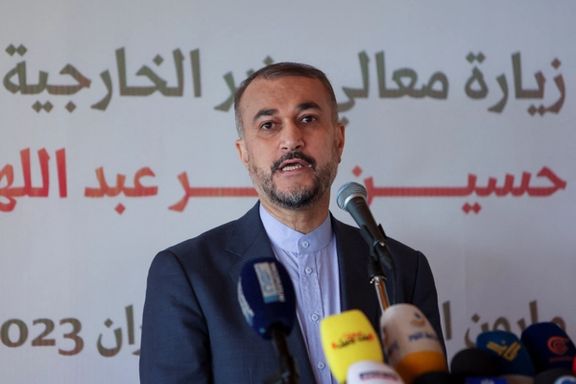
Iran's Foreign Minister Hossein Amir-Abdollahian said on Thursday that the continuation of crimes against Palestinians will receive a response from "the rest of the axis."

Iran's Foreign Minister Hossein Amir-Abdollahian said on Thursday that the continuation of crimes against Palestinians will receive a response from "the rest of the axis."
Amir-Abdollahian was speaking in Beirut on Thursday on a tour of Iraq, Lebanon and Syria. He was received at the airport by top officials of Hamas, Islamic Jihad and Hezbollah.
Israel has been pounding Gaza in retaliation for a Hamas rampage in Israel this week that has killed at least 1,300 people, the deadliest attack on civilians in Israeli history. More than 1,500 Palestinians have been killed.
The Iranian minister said the displacement of Palestinians and cutting water and electricity to the Gaza Strip are considered war crimes.
"Some Western officials have questioned if there is an intention to open a new front against the Zionist entity. Of course, in light of the continuation of these circumstances that are war crimes," he said, speaking through a translator, on television upon his arrival in Beirut.
"The continuation of war crimes against Palestine and Gaza will receive a response from the rest of the axis. And naturally, the Zionist entity and its supporters will be responsible for the consequences of that," Amir-Abdollahian said.
Western governments and media are also questioning Iran’s role in the Hamas attack and its long-standing financial and military support for militant groups in the region. The Iranian foreign minister’s remarks push Tehran further to the forefront of the conflict.
‘Axis of Resistance’ is a term coined by the Islamic Republic to refer to its proxy forces in the region including, Palestinian militant groups, the Syrian regime, the Lebanese militant group Hezbollah and other factions.
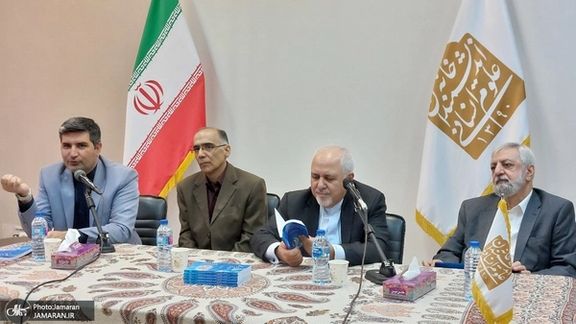
While no Iranian official dares to speak out against the Hamas attack on Israel, some go beyond praise with hints of flattery for the Supreme Leader’s political sleight of hand.
As all media are meant to echo the official stance of Ali Khamenei, Iran’s former Foreign Minister Javad Zarif, the architect of Tehran’s nuclear deal with the world and the mastermind behind the regime’s lobbying network abroad, hailed not only Hamas but also Khamenei for the regime's stance to distance itself from the Hamas massacre now shocking the world.
During an event to unveil his latest book, Zarif said, “Israel needs to create both internal and external adversaries for its survival,” tacitly referring to statements that implicated the regime in the Hamas multi-thronged attack on Israeli cities, which has killed over 1,300 Israelis and injured thousands more.
“Israel seeks to portray Iran as a threat. I am very pleased that our Supreme Leader disrupted the Israeli plot in his Tuesday speech. This was a necessity for Iran's national security," Zarif added. On Tuesday, Khamenei strategically changed his view about Iran's involvement in the Hamas terror attack in comparison to his earlier statement.
Earlier, Khamenei had said, "We intervened due to our enmity with Israel and the result was the victory in the 33-day and 22-day wars. We will help any group that would fight Israel." But his opinion was different on Tuesday after being cautioned and warned by US officials: "Islamic Iran is being named as the country behind this move [by Hamas]. But they make a mistake. This was done by Palestinians themselves."

Expressing any opinion on the Israeli-Palestinian conflict in Iran is a risky endeavor, as all officials and politicians must meticulously align themselves with Khamenei’s subtle nuances. In Iran, once Khamenei dictates the regime's policy themes concerning global developments, other officials, clerics, and his representatives across the country begin to disseminate them.
No matter the changes in Khamenei’s rhetoric or tone, the regime's position remains inherently contradictory. It applauds Hamas's bloody attack as a victory in their wish to uproot Israel, takes pride in its years of support for the Gaza-ruling terrorist group, and pledges further assistance, all while maintaining Iran's non-involvement.
After Khamenei sets the tone and direction, much of the saber-rattling is automatically delegated to his men installed in all the country’s organizations and governing bodies. His representative in the Revolutionary Guards, Abdollah Hajisadeghi, said Thursday that Israel "lacks the capability to confront the resistance front." The ‘resistance’ is the term the Islamic Republic regime calls its logistic, financial and intelligence support for the militia groups in the region, several of which were created by Iran.
He added that Iran must deliver this message to Israel with a resounding voice: "Until your complete annihilation, the Islamic Revolution and the Resistance front will never rest."
Khamenei’s chief of staff, Mohammad Mohammadi Golpayegani, said, "The Israeli prime minister said the head of the snake is in Iran; this is not the head of the snake, it is the staff of Moses, and it’ll swallow and destroy all snakes.” According to Biblical and Quranic stories, the Moses’ staff became a serpent and swallowed up all other staffs that had also been transformed into snakes by Pharaoh’s sorcerers.
Iran’s Foreign Minister Hossein Amir-Abdollahian, who is in Iraq on the first leg of his tour of the region to discuss the conflict, said Thursday "The Islamic Republic's stance on Palestine is unequivocal, and we have consistently supported the rights of Palestinian Muslims. However, what happened during the Operation Al-Aqsa Storm was an entirely Palestinian, self-driven reaction to the continued offenses and provocations committed by the Zionists against the Palestinian people.”
President Raisi also reiterated Thursday that Iran defends Palestine and “takes pride in defending their rights." He again congratulated Hamas on its “significant victories” in recent days.
Senior Hamas official Ali Baraka said in an interview with a Russian channel earlier in the week that “Hamas had been secretly planning the invasion of southern Israel for two years, even as it was making it seem like it was busy governing the Gaza Strip.” During all this time, Iran had been providing Hamas with military training, financial and arms support, and intelligence.
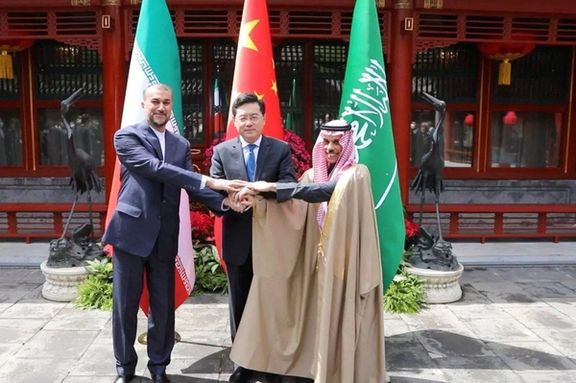
Tehran media had observed a shift in the attitude of Iranian officials toward Saudi Arabia, before the deadly Hamas attack on Israel, lavishly praised by the regime.
Didban Iran [Iran Monitor] website noted the inconsistency in the behavior of Iranian officials last week, comparing their friendly presence at the Saudi embassy to the provocative placement of a bust of former IRGC Quds Force Commander Qasem Soleimani in Esfahan's main football stadium where a the Saudi Ittihad team was scheduled to face an Iranian team within the frameworks of the AFC Champions League earlier this month.
The website also noted state-owned media outlets, such as the ultraconservative daily Kayhan, adopted a less-than-friendly approach. The Khamenei-linked daily's editor Hossein Shariatmadari wrote in a strongly-worded commentary after the match was cancelled that "Iran should ban any match between Iranian and Saudi teams anywhere in the world." Shariatmadari further criticized Foreign Minister Hossein Amir-Abdollahian for not announcing such a ban.
According to Didban Iran, the shift in behavior was not limited to state officials as some Revolutionary Guard commanders, members of the Iranian parliament, state-owned media and revolutionary institutions have also appear to have changed their friendly rhetoric toward Saudi Arabia. The website noted that these are the same officials, media outlets and state organizations that seven months ago praised the Tehran-Riyadh rapprochement as "the Raisi administration's miracle."
The website recalled that Kayhan had said seven months ago that "Iran has achieved the rapprochement with Saudi Arabia from a position of power." The daily had called the resumption of Tehran-Riyadh ties "a slap in the face of the United States and Israel." However, on Saturday, the Kayhan threatened Saudi Arabia, stating that " the revolutionary organizations will confront you if you approach Israel."

The website quoted a deputy commander of the IRGC as saying that "relations with Saudi Arabia will be desirable if they can save the Palestinian nation." This comes while earlier, Yahya Rahim Safavi, a former IRGC commander who is currently Supreme Leader Ali Khamenei's top military adviser had said that "renewing ties with Riyadh has brought about an earthquake for the US hegemony in the region."
Didban Iran also highlighted the change of tone of members of the Iranian parliament about Saudi Arabia following the incident in Esfahan. Generally, the website accused Iranian politicians and military commanders of having double standards about Saudi Arabia.
Khabar Online website last week characterized the shift in the approach of Iranian hardliners as "renewed attempts to disrupt relations between Iran and Saudi Arabia." It also noted that Iranian hardliners made it clear they detested Amir-Abdollahian's attempt to prevent a new tension between Tehran and Riyadh and started a new round of attacks on him.
In another development, former moderate conservative lawmaker Mansoor Haqiqatpur told Nameh News website: "Iran has called the renewing of ties with Saudi Arabia a strategic agreement. But does Saudi Arabia see the rapprochement in the same way? Or Riyadh bought some time to facilitate China's trillion-dollar investment in the Saudi energy sector?"
Haqiqatpur opined that by demanding the removal of Soleimani's bust, "Al-Ittihad disrespected Iranian people's values and Soleimani's status." He further called on the Iranian government to take a clear stance about the matter and say whether what happened was a mistake by Iran or Saudi Arabia.
Responding to this question will not be easy in Iran's volatile political situation, particularly because the question has been framed in a way to leave the ultraconservative government speechless in front of its political rivals.
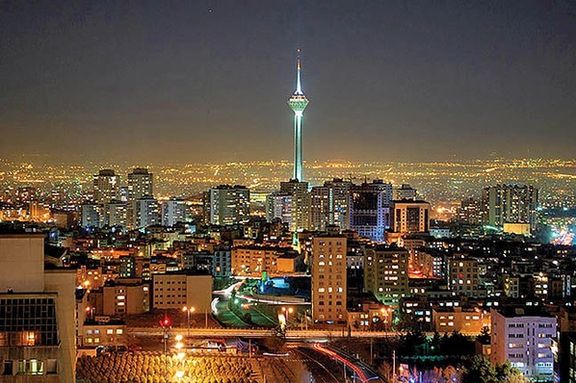
A recent report shows severe economic challenges faced by workers in Iran with approximately 55% of laborers' wages being allocated towards rent.
In the capital, Tehran, the proportion is even more alarming, with workers spending an astounding 100% of their wages on housing expenses.
More than 60% of wage earners and retirees in Iran find themselves grappling with rising rental costs, as revealed by ILNA's case study on the share of housing rent in several Iranian cities. In Rasht city in the north, rent can be as much as 70%, and in Zahedan, up to 60% of a laborer's monthly wage.
The minimum wage for a married worker with all benefits hovers just above $180 per month, while the minimum cost of food for an average three-person household is at least $140 to $160.
Babak Negahdari, the head of the Parliament's Research Center, recently stated that housing prices and rents have surged tenfold since 2018. However, wages have not kept pace with these exorbitant increases.
The economic disparity persists while reports indicate that the average monthly expenses for housing in Tehran province surged from $100 in 2021 to $160 over the last year. Furthermore, Iran's Statistics Center reveals that costs for housing, water, sewage, fuel, and electricity have surged by nearly 60% in 2022.
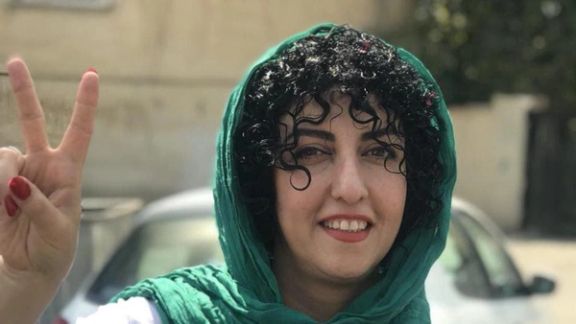
A group of independent rights experts from the UN has called for the release of Iranian Nobel laureate Narges Mohammadi.
Last week, the imprisoned Iranian activist was awarded the Nobel Peace Prize in spite of her imprisonment at the notorious Evin Prison in recognition of her fearless dedication to women's rights in Iran.
She is currently serving an extended jail term for charges related to "spreading anti-state propaganda," as stated in a press release from the UN Human Rights Council-appointed Working Group on Arbitrary Detention.
Since she began her campaigning, she has faced multiple arrests, with her initial detention occurring in 2011 due to her advocacy on behalf of imprisoned human rights activists and their families. In 2015, she was rearrested and handed additional prison sentences.
The UN Working Group on Arbitrary Detention highlighted that Iranian authorities persist in depriving Mohammadi of her freedom, despite concerns about her deteriorating health in detention and against the advice of medical professionals. Her detention runs counter to Iran's international human rights obligations.
The experts expressed deep regret that despite calls from the United Nations and the international community, Iranian authorities continue to criminalize Narges Mohammadi for her human rights advocacy.
The UN group consists of five independent experts appointed by the UN Human Rights Council. Their mandate includes investigating cases of arbitrary detention which goes against international standards outlined in the Universal Declaration of Human Rights and other international legal instruments accepted by the concerned States.
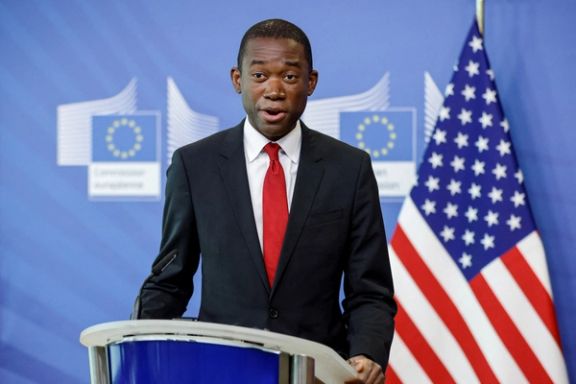
The United Sates and Qatar have apparently agreed to stop Iran from accessing $6 billion in released funds, on deposit in Qatari banks, for humanitarian purchases.
US Deputy Treasury Secretary Wally Adeyemo has told House Democrats that after the October 7 bloody Hamas attack on Israel and the death of more than 1,000 civilians, the US and Qatar reached the deal to deny Iran the use of the funds for buying non-sanctionable goods, the Washington Post reported.
CBS News called it a "quiet understanding", not a formal agreement.
The Biden administration reached a hostage release deal in August to allow South Korea to unblock $6 billion of accrued Iranian oil income and transfer the money to Qatar in exchange for the release of five Americans held by Iran. The deal led to sharp criticism by Republicans, some Democrats and Iranian American activists, who labeled the released funds as “the biggest ransom payout in history”, which would embolden the Iranian regime and encourage hostage taking around the world.
According to the report, Adeyemo told lawmakers that the money “isn’t going anywhere anytime soon.”
During a presser from Israel on Thursday evening, US Secretary of State Antony Blinken was asked about the Washington Post report. “None of the funds that now have gone to Qatar have actually been spent or accessed in any way by Iran,” he said dodging a direct answer if the US have agreed to block Tehran’s access to the money.
“Funds from that account are overseen by the Treasury Department and can only be dispensed for humanitarian goods; food, medicine, medical equipment, and never touch Iranian hands. We have strict oversight on the funds, and we retain the right to freeze them,” he added.
Critics of the White House’s decision to give Iran access to the $6 billion argue that the money is fungible and that any funds Iran receives, regardless of how it can spend it, would free up more money for it to fund terrorism.
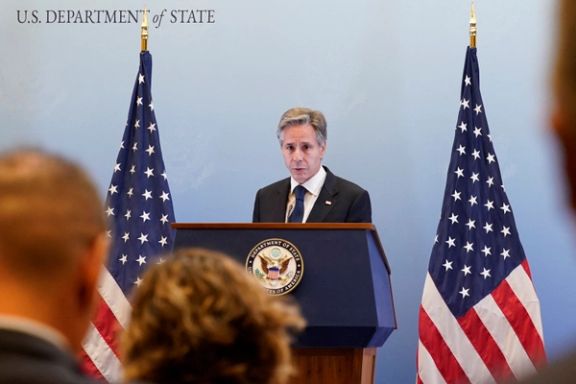
In a statement after the publication of the report, Iran’s mission at the United Nations rejected Adeyemo’s claim, saying that "This news is not true, and its publication questions the credibility of The Washington Post." "US senators and government are fully aware that they cannot back out of the agreement,” Iran’s state media cited the mission as saying. Nour News, linked to Iran's Supreme National Security Council, also reported late on Thursday that contrary to the Washington Post’s report, Iran has full access to the funds in Qatari banks.
On Wednesday, Treasury Secretary Janet Yellen said, “These are funds that are sitting in Qatar that were made available purely for humanitarian purposes and the funds have not been touched. I wouldn’t take anything off the table in terms of future possible actions.”
Before Yellen, John Kirby, spokesperson US National Security Council had suggested that the funds “can be re-frozen” at any time. In an interview with MSNBC, Kirby said: “None of it has been allocated. None of it has been spent.”
A bipartisan bill has been introduced in the US Senate to stop the use of the funds by Iran.